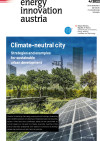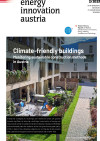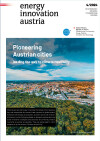Suchergebnisse
Smart & Urban Tree - Exploring integrative possibilities of structures for urban shading
The project "Smart & Urban Tree" explores large-scale artificial structures, which may serve as a supplementary alternative to other greening measures, such as trees and facade greenery, in dense urban contexts, where traditional concepts cannot be applied in a satisfactory manner. Such structures offer a wide-range of to-be integrated functions and can contribute to mitigation of urban heat islands.
GreenTech-Renovation - Energetic Renovation of Glass Buildings of Architectural Value
The focus of the GreenTech-Renovation project was to find innovative solutions for the energetic renovation of architecturally valuable buildings with a high proportion of glass. A future-oriented building physics concept that includes the use of alternative forms of energy had been developed for this purpose. With ecological and social commitment, an intelligent usage concept could strengthen the energetic renovation concepts and guarantee their sustainability. The 10-Rs of the circular economy (Refuse, Rethink, Reduce, Reuse, Repair, Refurbish, Remanufacture, Repurpose, Recycle, Recover) will serve as a guideline.
KlimaStadtLinz2030: Linz and its path to climate neutrality by 2030 - Preparation for the EU - Mission “100 Climate-neutral Cities by 2030”
The research project investigates whether and how it is possible for the city of Linz to achieve climate neutrality by 2030 within its own sphere of influence. A common vision, which is being developed with the citizens in a participatory manner, unites the opportunities that arise for the city through the measures necessary for this goal.
greenWATERrecycling – utilization of greywater for energy recovery and for providing greywater-filtrate for watering green walls
Development of a system for energy-recovery of waste heat of greywater and of greywater-filtrate in ordert o reduce the energy consumption of hot water supply and the water consumption for irrigation.
Energy Mosaic Austria - Austrianwide modelling and web-based visualisation of energy consumption and greenhouse gas emissions on local level
The project consists of a modelling and a web-based visualisation of energy consumption and greenhouse gas emissions of all Austrian cities and municipalities considering all kinds of land use and mobility. The results deliver a sound basis for numerous energy and climate relevant fields of action and for awareness raising of decision makers and the public.
SmartCity Baumgarten - Demonstration of an anergy network and implementation of climate-friendly solutions in existing districts
Implementation of a cross-property anergy network for the supply of heating, cooling and electricity in an existing neighbourhood. With this demonstration project, a technical-legal alternative for areas outside of district heating supply is developed, which makes it possible for neighbourhoods to join together to use renewable energies in common.
P2PQ - Peer2Peer im Quartier
The research project Peer2Peer im Quartier deals with applications optimizing the selfconsumption of PV-generated energy within urban quarters by enabling peer-to-peer relations among energy prosumers based on Blockchains. Aim is to develop and validate these applications in real operation.
Mission: Climate Neutral City
With the mission "Climate Neutral City", the BMK has set a focus that will enable Austrian cities and municipalities to implement the climate & energy targets. Comprehensive research activities and accompanying measures act as "enablers" to make the path towards climate neutrality visible, to develop demonstrate it.
RENOWAVE.AT - The innovation lab for sustainable, climate-neutral renovation of buildings and districts
RENOWAVE.AT will act as a central contact point for collaboration in innovation projects and provide systematic and early access to as well as promote innovative, scalable renovation concepts and sustainable renovation technologies within real development environments (open innovation principle).
Climate-neutral city

Strategies and examples for sustainable urban development
energy innovation austria
4/2022
Herausgeber: BMK in cooperation with the Climate and Energy Fund
Englisch, 12 Seiten
Downloads zur Publikation
Digitization in the construction and real estate industry
In the multitude of digital possibilities, it is very difficult to maintain an overview, to assess trends and potentials, and to recognize correlations. This report therefore aims to describe the current state of the art and the market assessment of promising digital technologies. Information is provided on concrete use cases, added value and challenges of the respective technologies. The analyses presented serve to assess the potential and set the strategic course for the integration of the currently most important digital technologies in the construction and real estate industry.
Digital transformation of the Austrian construction industry and its impact on employment
What are the impacts of the digital transformation of the Austrian construction industry on this sector’s labour market? By looking at the next five to ten years it will be analysed whether and to what extent digital applications lead to an increasing, falling or stagnant demand for employees in the construction industry and in construction occupations.
Monitoring of multi-family houses “Tonpfeifengasse”
Evaluation of activated building parts as heat storage for renewable energy shown on the example of the multi-family houses "Tonpfeifengasse".
LehB:klimafit! Live in existing buildings today: climate fit together
The aim of the project is to explore transferable renovation concepts for the implementation of climate-fit renovations in Vienna. Integrally optimized renovation packages will be developed, which will be optimized in the building ensembles for implementation-probable, climate-friendly overall solutions with the relevant stakeholders.
DALEC - Day- and Artificial Light with Energy Calculation
In the course of DALEC an online concept evaluation tool for architects, building engineers, lighting designers and building owners was developed. Although easy to use, the software accounts for the complex thermal and light processes in buildings and allows a simple evaluation of heating, cooling and electric lighting loads. Not only energy, but also user behavior were considered (e.g. in terms of glare protection) and visual and thermal comfort were evaluated. This novel and innovative, holistic approach makes sustainable and energy efficient building design possible for new buildings as well as refurbishment.
Programme Evaluation of "City of Tomorrow" 2013 - 2021
This evaluation examined the effects that the "City of Tomorrow" programme has achieved since its inception. The evaluation is based on extensive surveys of research project participants and various multipliers from application areas such as civil engineering and urban planning. The evaluation thereby creates an important basis for the design of future research funding.
LINE-FEED - Plug-in Photovoltaic Storage for the Wall Socket
The project LINE-FEED developed technologies that are required for a photovoltaic storage system which can be installed by anybody by simply plugging it into a wall socket. The aim was to create a storage system for households in urban areas that do not have the possibility to install a photovoltaic system themselves.
Climate-friendly buildings

Monitoring sustainable construction methods in Austria
energy innovation austria
2/2023
Herausgeber: BMK in cooperation with the Climate and Energy Fund
Englisch, 12 Seiten
Downloads zur Publikation
Pioneering Austrian Cities

Pioneering Austrian cities leading the way to climate neutrality.
energy innovation austria
4/2024
Herausgeber: BMK in cooperation with the Climate and Energy Fund
Englisch, 12 Seiten
Downloads zur Publikation
BIMaterial Process Design for Material Building Pass
Building Information Modelling supported compilation of a Material Building Pass; as a qualitative and quantitative documentation of the material composition of, and the material distribution within, a building structure. This project is a central milestone towards standardized, BIM-generated building material passes.
